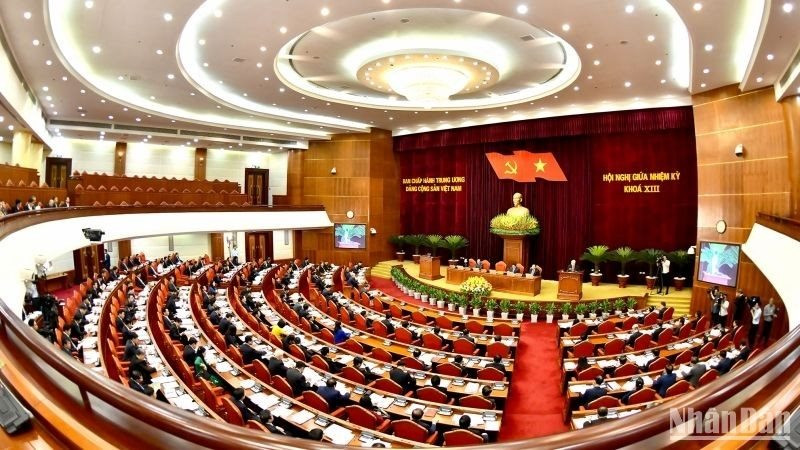Recently, some famous figures who "dare to speak and act" have been discovered to have violated discipline and the law, demonstrating inconsistency between words and actions and political opportunism in fighting corruption and negativity.

Speaking at the mid-term conference of the 13th Party Central Committee, General Secretary Nguyen Phu Trong reminded: We must avoid the situation of "With our own feet still covered in dirt/ Holding a torch to rub other people's feet" to warn and prevent this very worrying "disease" among a number of cadres and party members. This is both a manifestation and one of the causes leading to "self-evolution" and "self-transformation"...
In recent times, along with the important results of the fight against corruption and negativity, many cadres and party members, including leaders at all levels, have been disciplined and criminally prosecuted. It is worth noting that some cadres, while in office, were famous for their strong and decisive statements in directing and admonishing subordinates and the masses to strive to live well, make efforts to contribute, avoid being tempted, falling into individualism leading to mistakes, political and moral degradation...
In fact, there are many cadres who have eloquently preached: Cadres, party members, and civil servants must work for the people, must not be corrupt or negative; must adhere to revolutionary ethical values, public service ethics; must strive to study and follow Ho Chi Minh's ideology, ethics, and style through practical, concrete actions to set an example for the masses... However, not long after that, these cadres were "caught" by the law with a series of violations at the time before speaking, even at the time they were eloquently speaking. These individuals demonstrated false integrity to cover up and conceal public opinion and the organization. They even thoroughly directed inspections, checks, and strict handling of subordinate cadres and employees for violations.
There are many causes of this "disease", but the most fundamental cause comes from irregular and continuous training, leading to "self-evolution", "self-transformation", giving rise to bad habits, lack of exemplary behavior, affecting colleagues, teammates and the collective. There are also people who are lured, enticed, forced by impure individuals... leading to degeneration, seeking to discredit others.
The above negative phenomena cause great consequences for individuals and organizations, making comrades and colleagues dissatisfied. Any agency or unit with such cadres is likely to lose solidarity. If the leader has such bad qualities, it will eliminate the spirit of self-criticism and criticism, leading to a situation where subordinates are discouraged and have negative thoughts. Good people are not recognized, which can lead to dissatisfaction and "self-evolution"; creating a favorable environment for flatterers, factions, and weak people to act arrogantly. The most dangerous consequence is that cadres "say one thing and do another", say well but do poorly, making the masses angry and losing faith in the Party, the State, and the cadres and party members; even creating a mentality of doubting the strong statements and drastic actions of leaders who truly have good qualities and abilities.
To avoid this "disease", first of all, Party committees and organizations must strengthen education and reminders, making each cadre and Party member deeply and fully aware of the implications of this teaching; thoroughly grasp and correctly implement the principles of self-criticism and criticism in Party activities. At the same time, it is necessary to maintain and strictly implement the Party's regimes and principles; take measures to remind, orient and require Party members to uphold the spirit of fighting for self-criticism and criticism. In particular, Party committees and superior leaders must regularly pay attention to inspection and supervision, take measures to promptly detect, rectify and require subordinate cadres to properly implement the principles of self-criticism combined with criticism, ensure strict compliance with the principles of democratic centralism, collective leadership, and individual responsibility; constantly cultivate, train and truly set an example before the masses. The practice of setting an example must be given special attention, ensuring that words go hand in hand with actions, the leader acts first and sets an example first. Strengthen inspection, supervision, detection and timely handling of violations, officials who do not set an example, spread distorted rumors, slander others or send false, anonymous, or impersonated denunciations...
In addition, agencies and organizations need to pay attention to building a cultural, civilized, and united working and living environment; ensuring democracy, publicity, and transparency in work contents and policies in accordance with regulations to create consensus and clarity in ideology, eliminating "dark spaces" and ambiguity that create opportunities for bad habits to arise.
LE QUY HOANG